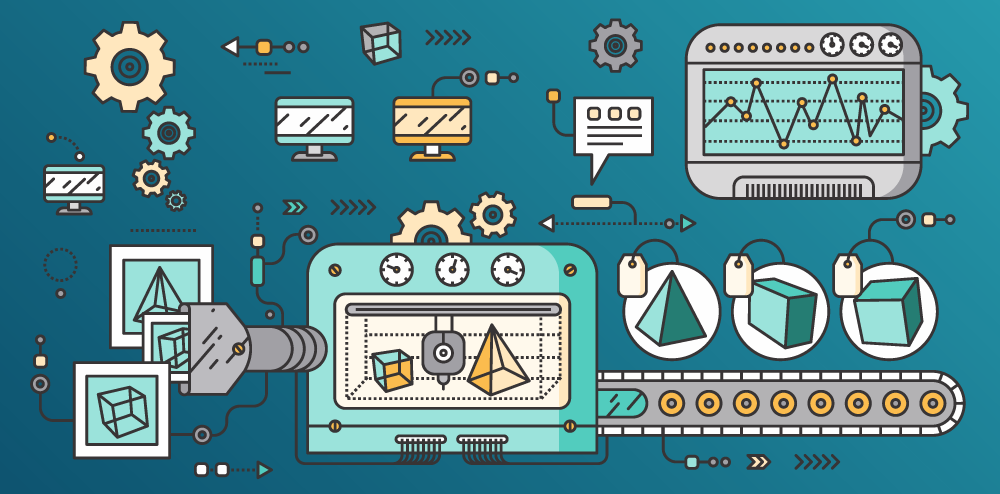Why People are the Real Key to Machine Learning

Machine learning (ML) technology has existed for decades and, with all of the recent interest in IIoT and Industry 4.0, now seems to be capturing the attention of more manufacturers. A lot of our Ignition community members have shown interest in the subject, and our Co-Directors of Sales Engineering Travis Cox and Kevin McClusky, and Senior Software Engineer Kathy Applebaum, shared some of their collective knowledge about ML on a recent "Design Like a Pro" webinar.
Kathy, who holds a master's degree in machine learning, explained during the webinar that ML can be broadly defined as the effort to give computer systems the ability to learn and improve from experience, similar to how humans do. ML is considered a subset of artificial intelligence (AI), and it also overlaps significantly with the field of analytics, which is all about discovering the knowledge within your data.
What If You Had the Power of Prediction?
Predictive analytics, and specifically predictive maintenance, is the ML application where manufacturers currently see the greatest potential ROI. Imagine that a manufacturing company has several large motors that each cost over $1 million. To minimize the risk of downtime, the company monitors the motors closely and keeps a spare motor in its inventory in case one of the active motors breaks down. However, if the company could predict that one of its motors is going to fail soon, they could purchase a new motor and have it in place before any downtime could occur. The company could keep its productivity high and spend less money and labor on preventive maintenance.

In addition to predictive maintenance, there are several other potential industrial applications of ML, including predicting machine settings, quality control, forecasting of demand and raw-material prices, training industrial robots, and more.
Machine learning certainly holds tremendous potential but companies should be aware that it won’t deliver instant results. As when adopting any new technology, there are many important factors to consider and steps to take before implementing ML.
ML Data: You Need Great Quantity and Quality
Just as humans need a lot of information and experience in order to learn new skills, heavy amounts of data are required to create ML models. Once built, these models can be run against live data in real time to check for anomalies.
Before your organization gets into ML, it should be in the practice of collecting data from a variety of sources, such as process data from devices, as well as historical, ERP, maintenance management, and so on. Exactly how much data you’ll need depends on what you want to accomplish but, in general, the more data an organization already has, the better a candidate it is for ML.

Speaking about the importance of data collection in ML, Travis pointed out that data collection should be automated, not manual. "We don’t want to rely on operators entering information that could be faulty or are just estimates. We want to get information directly from the sources, automatically," he said.
While having a large quantity of data is important in ML, the quality of the data is even more important. Your results will only be as accurate as the data that you have coming in. Poor-quality data will only yield poor-quality answers. The data you’re using for ML needs to be labeled as good or bad, otherwise it’s basically useless.
So while you don't want to collect data manually, you do want to label data manually. Computers may be fast but are simply too "dumb" to label data correctly.
Statistics Knowledge and Domain Knowledge are Essential
Therefore, machine learning implementation requires a dedicated person or group of people with statistics knowledge and domain knowledge.
Humans with a strong knowledge of statistics and linear algebra can make sure that your sample data is representative, that correlation doesn’t get confused with causation, and can figure out your exact accuracy requirements.

However, putting a math whiz in charge of your ML project won't be enough. You'll also need someone who possesses domain knowledge, i.e., an in-depth understanding of your industrial process. Only an individual with domain knowledge will know what the sample data represents in reality, which types of data are the most promising, and when the results you’re getting don’t make sense.
As Kathy explained: "Once you’ve picked a question to answer, your domain knowledge will tell you what types of data might help answer your question. Based on your knowledge of your process, you'll know that some types of data are very important and some types are not, and that is going to be very crucial for getting good answers out of your machine learning project."
With domain knowledge on your side, instead of being strictly limited to the data you know you have, you’ll also be able to think about what other kinds of data would help solve your problem. You’ll be able to think of ways to acquire missing data, or to work around missing data by rethinking your process.

Other Steps to Implementation
Beyond collecting and labelling large amounts of data through the application of both statistics and domain knowledge, there are other important steps to getting a machine learning project off the ground.
You’ll need to extract, transform, and load (ETL): extract data from existing sources, transform the data into a usable and consistent format, and load it into a location where it will be useful and easily accessible. Also, it is important to visualize the data, to determine which type of algorithm and which platform (in terms of both hardware and software) to use, and to test the accuracy of your model.
While there are many steps involved in getting the right people and processes in place for machine learning, the effort is definitely worth it. If it’s done the right way, an ML project can save your organization huge amounts of money and greatly increase its speed after just a few months of development.
Here’s Our Advice
During our webinar about ML, each of the presenters offered some closing advice for implementing it successfully. Kathy reemphasized the importance of applying domain knowledge to the problem. "You need to really think about what data is coming in that is going to be useful to your project, and what data that you want to get out, and the only way to do that is by really understanding the problem," Kathy said.
Kevin, who works with many customers who use ML solutions that incorporate the Ignition platform, said that companies will get better results from ML if they first educate themselves about it. "It is important to really have that knowledge about machine learning, about the algorithms, and about how things work behind the scenes, rather than just throwing things at an algorithm," he said.
Lastly, Travis added that those who are getting into ML shouldn’t be afraid to fail and should try out some of the available ML tools so they can learn how to use them effectively. He said that in a few hours, users can experiment with sending data to an ML software platform and creating models in order to start getting an understanding of the process, even if the results aren’t necessarily good at first. "Once you understand that process, and you start learning the algorithms, and you know how this all fits together, then you are going to be more sophisticated in how you can approach it," Travis said.
Keep Learning About Machine Learning
If you'd like to hear a more detailed discussion about implementing machine learning, including Kevin's demos of a sample ML project and the Microsoft Azure ML Studio platform, check out our full webinar on the subject (click on the video player below).
At Inductive Automation, we’re always looking to keep our community informed about the latest technology trends impacting the industry. At our annual conference, we’re planning to have sessions and workshops on many current topics, including machine learning. You can learn more about the Ignition Community Conference here.
What are some of your comments or questions about machine learning? How prepared do you think your company is to start applying ML? What kind of ML applications would you like to try? How much of an impact do you think it will really have on manufacturers? Tell us what you think down in the comments section!
